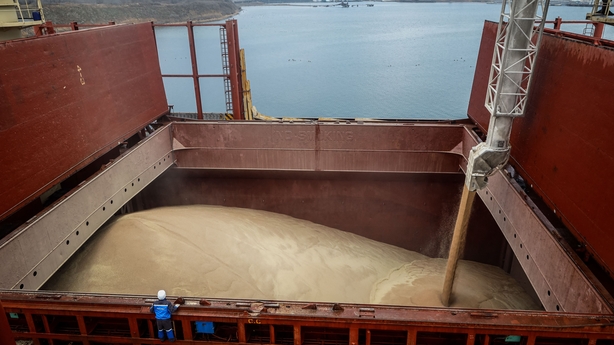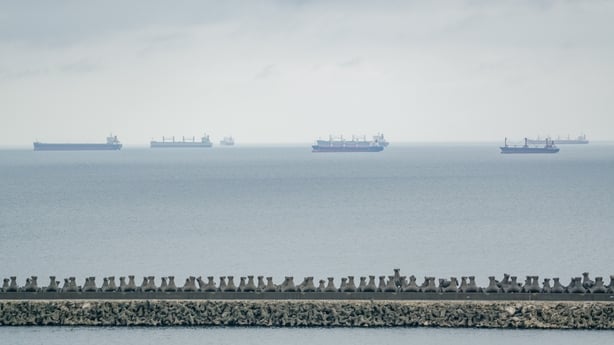Millions of people facing hunger will "pay the price" of Russia's decision to exit the Ukraine grain deal, UN Secretary General Antonio Guterres has said.
Today, Russia halted participation in the year-old UN-brokered deal that lets Ukraine export grain through the Black Sea.
The move spread fear in poorer countries that price rises will put food out of reach.
Hours earlier, a blast knocked out Russia's bridge to Crimea in what Moscow called a strike by Ukrainian sea drones.
The Kremlin said there was no link between the attack and its decision to suspend the grain deal, over what it called a failure to meet its demands to implement a parallel agreement easing rules for its own food and fertiliser exports.
"Unfortunately, the part of these Black Sea agreements concerning Russia has not been implemented so far, so its effect is terminated," Kremlin spokesman Dmitry Peskov told reporters on a conference call.
Mr Guterres signalled that Russia's withdrawal meant that the related pact to facilitate Russia's grain and fertiliser exports was also terminated.
"Today's decision by the Russian Federation will strike a blow to people in need everywhere," he told reporters.
Moscow said it would consider rejoining the grain deal if it saw "concrete results" on its demands but that its guarantees for the safety of navigation would meanwhile be revoked.
Speaking this evening, US Secretary of State Antony Blinken said Russia's decision to halt participation in the deal was "unconscionable" and called for the pact to be restored as quickly as possible.
The White House said Russia's suspension of the pact "will worsen food security and harm millions".
Global food prices

Ukraine and Russia are some of the world's biggest exporters of grain and other foodstuffs and any interruption could drive up food prices across the globe, especially in the poorest countries.
Shashwat Saraf, the emergency director in East Africa for the International Rescue Committee (IRC), said the impacts would be far-reaching in Somalia, Ethiopia and Kenya, which have been facing the Horn of Africa's worst drought in decades.
"I don't know how we will survive," said Halima Hussein, a mother of five children living in a crowded camp in Somalia's capital Mogadishu for people displaced by years of failed rains and violence.
Ukraine's President Volodymyr Zelensky raised the prospect of resuming grain exports without Russia's participation, suggesting Kyiv would seek Turkey's support to effectively negate the Russian de facto blockade imposed last year.
"We are not afraid," spokesperson Serhiy Nykyforov quoted Mr Zelensky as saying. "We were approached by companies, shipowners. They said that they are ready, if Ukraine lets them go, and Turkey continues to let them through, then everyone is ready to continue supplying grain."
The grain deal was hailed as preventing a global food emergency when it was brokered by the United Nations and Turkey last year.
Global commodity food prices rose today, though the increase was limited, suggesting traders did not yet anticipate a severe supply crisis.
Turkish President Tayyip Erdogan, the grain deal's sponsor, said earlier today he still believed Vladimir Putin wanted it to continue.
Western countries say Russia is trying to use its leverage over the grain deal to weaken financial sanctions, which do not apply to Russia's agricultural exports.
European Commission President Ursula von der Leyen described Russia's suspension of the agreement as a "cynical move" and said the EU would continue to try to secure food for poor countries.
US aid chief Samantha Power announced more than $500 million in humanitarian assistance during a visit to Ukraine, where the United Nations says some 17 million people need help following Russia's invasion.

Without Russia?
Russia has extended the Black Sea deal three times in the past year, despite repeated threats to quit.
It suspended participation after an attack on its fleet by seaborne Ukrainian drones in October, leading to a few days when Ukraine, Turkey and the United Nations kept exports going without Moscow.
Denys Marchuk, deputy head of the Ukrainian Agrarian Council, the main agribusiness organisation in Ukraine, said seaborne exports might proceed again without Russian agreement.
"If there will be safety guarantees from our partners, then why not conduct the grain initiative without Russia's participation?" he told Reuters.
Any such resumption of shipments without Russia's blessing would probably depend on insurers.
Industry sources told Reuters they were studying whether to freeze their coverage.
"The (key) question is whether Russia mines the area which would effectively cease any form of cover being offered," one insurance industry source said.
The latest blast on Russia's bridge to Crimea follows months of Ukrainian strikes on Russian supply lines as Kyiv pursues a counteroffensive to drive Russian forces out of its territory.
Read more: Explained: Why does the expiry of the Black Sea grain deal matter?
